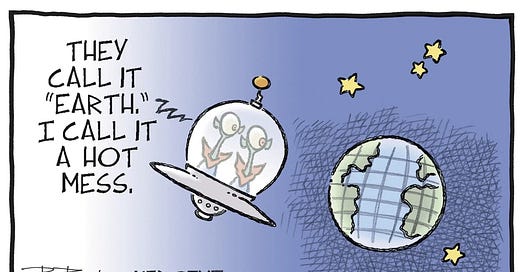Global Democracy Declines
The article linked above addresses the decline in measures of political democracy around the world.
“Bangladesh, Romania, Tunisia, and South Korea were among the largest contributors to this decline. Bangladesh fell sharply due to a rigged election, a mass uprising, and Prime Minister Sheikh Hasina fleeing the country. Romania sank after its presidential election was annulled due to Russian interference. Tunisia dropped after its president jailed opposition leaders. And South Korea declined due to the president’s attempt to impose martial law.”
The stronger democracies are in North America and Europe.
So, what distinguishes these diverging political trends? The regions where democracy is being challenged are in the periphery countries to the global economy - developing countries or smaller countries on the periphery. The core is defined by the most advanced industrial democracies that have developed stable political and economic institutions, while periphery countries are newly developed and still suffer from institutional instability.
The connection we need to make is how global finance influences the economic and thus political destinies of the periphery vs. the core. Finance concentrates wealth and resources as a centripetal force that draws these resources into the core. This is starkly true when it comes to finance and capital. In the US, NY’s Wall Street is the core; in Europe London and, to a lesser extent, Frankfurt are the cores. In Asia the financial core has been Hong Kong and Tokyo. These financial centers capture most of the wealth that capitalism generates and this centripetal effect has been accelerated by the financialization of the global economy under the US$ fiat currency international monetary regime.
When finance concentrates wealth, it aggravates economic inequality and divergence between the periphery and the core. This creates economic and political instability at the periphery (as well as domestically). Economic crises lead to political crises that periphery countries cannot easily manage with their nascent institutions. This leads to authoritarian and nationalist impulses that can often spill into military conflict with neighboring states. It becomes a fight for survival.
The point here is that this does not happen accidentally or randomly. The post-WWII trend to democracy has been upended by policies adopted in the core, but also in the periphery. The two main culprits here are US$ policy driven by the Federal Reserve in the US and copied by the major central banks in England, Brussels, Tokyo, and Beijing. Such policies have sucked financial capital into the core and driven the asset price bubbles we see in these countries, especially in real estate and stock and bond markets. US Federal Reserve policy is the dominant force in global finance.
The second culprit has been Chinese mercantilism that has used financialization and subsidization of Chinese manufacturing and labor to suck up all the labor intensive manufacturing out of the developing world. So the periphery has been hit with a double-whammy: loss of financial capital combined with the loss of export revenues. This can only lead to increased economic and political instability, which is exactly the trend we observe and is chronicled in this article above on the decline in global democracy.
It is a mistake to believe that certain nationalistic political figures are driving this trend - leaders like Orban, Putin, Milei, Xi, Trump, etc. This rightward shift in global democracies is a product of the past half-century of policy blunders, mostly between the West, led by the US, and China. The decline of global democracy is due to weak democratic institutions unable to manage the effects of these policy blunders that originated at the core. Until those policies shift to a more sustainable global economy and monetary regime, the decline in democracy is likely to continue. This mismanagement is now reflected in trade conflicts over tariffs and deficits. A multi-polar world is far more volatile and unpredictable than a unipolar or bipolar world.





A good opinion, a great lesson